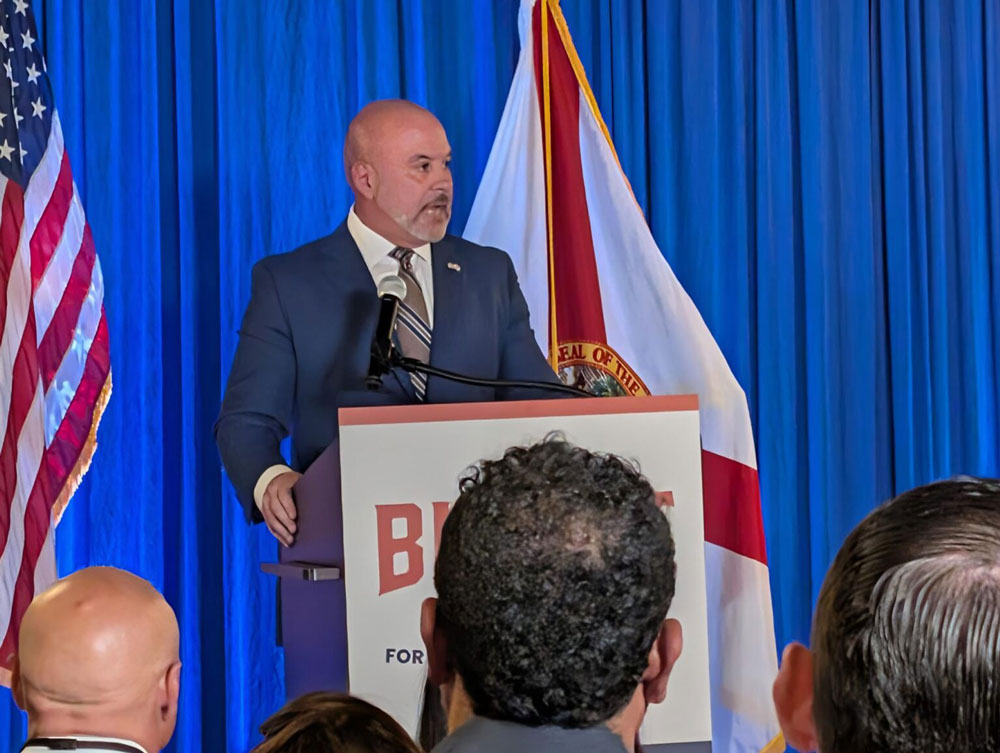
Florida Chief Financial Officer Blaise Ingoglia traveled to Alachua County Thursday, where he said his Department of Government Efficiency (DOGE) team of auditors had determined that the local government had indulged in more than $84 million in “wasteful spending” over the past five years.
He said that meant that the county’s general fund budget has grown by $140 million since 2019-2020, or 77%. Gainesville is the county seat.
But as has been the case with the other local government budgets that Ingoglia’s team has reviewed this year, he did not mention any specific programs that constituted what he defined as wasteful spending.
“I will tell you that I was at a meeting this morning and I have seen some of the things that your local government is spending money, and I can assure you that I think the taxpayers would be very unhappy with what they’re spending the money on,” he said.
When pressed by a reporter to give his definition of a superfluous program, Ingoglia wouldn’t do so.
“It’s not our job to micromanage,” he said. “The people who should be micromanaging are the people who get paid to micromanage.”
This was Ingoglia’s fourth preliminary report of a local government’s alleged overspending announced since last month, shortly after he was appointed to serve as CFO by Gov. Ron DeSantis.
On Wednesday, he claimed that Hillsborough County had overspent by nearly $279 million. Last week, he alleged that Orange County had overspent by more than $190 million, and the city of Jacksonville’s government by $200 million.
The announcements are taking place as he (and the governor) travel up and down the state making the case that Floridians should vote next year for a (still to be written) constitutional amendment to eliminate or severely reduce property taxes.
One thing that Ingoglia did not mention during his press conference is the fact that, for the ninth consecutive year, the Alachua County Commission has reduced its countywide property tax millage rate. In the $947 million Fiscal Year 2026 budget approved earlier this year week, leaders reduced the rate by 15%.
“Approving this budget is a testament to our commitment to fiscal responsibility and community priorities,” said Commission Chair Charles Chestnut IV in a written statement. “I am proud that we have reduced the millage rate for the ninth consecutive year in our ongoing efforts to ease the tax burden on residents while still funding essential services like public safety, infrastructure, and programs that enhance our residents’ quality of life.”
Alachua County officials said immediately after Ingoglia’s press conference that they weren’t prepared to provide any formal response.
“We listened to the press conference and we will take the next couple of days to check on what he has to say,” said Mark Sexton, the county communications director.
Ingoglia has been making the case that local governments are overspending to preempt criticism by local government officials that reducing property taxes would severely harm basic government services that they pay for, such as police, fire, parks and recreation, libraries, and public health.
Local government officials in other parts of the state have defended their increased budgets in recent years, citing inflation and rising population.
“We’ve already accounted for fire and police,” Ingoglia said Thursday, anticipating that’s what local officials in Alachua may claim.
“As populations grow, you are going to need more fire. You are going to need more police,” he acknowledged. “What it doesn’t mean is that you’re going to need more bureaucrats. And that’s what we have seen. A lot of these governments are expanding the bureaucracy, not necessarily the things that they are supposed to be funding.”
Ingoglia noted that the focus has been on property taxes generated from the general fund budget, not including school boards. “I will tell you from some of the numbers that I have seen, the school boards are some of the biggest, wasteful spenders that I have seen.”






























Pogo says
@Consider the source
…when only the worst will do:
‘splain this — or prove it’s wrong.
https://justfacts.votesmart.org/candidate/biography/149443/blaise-ingoglia
Jim says
Florida Chief Financial Officer Blaise Ingoglia is the lowest form of politician there is. Anyone in a position such as his who gives such a speech to the public making huge claims of wasteful spending yet refuses to name a single example of that wasteful spending is just a political hack. He has no credibility. Only politicians can get away with such BS and continue in their job. In the real world, (i.e., outside government), if a (so-called) leader held a meeting and claimed huge amounts of wasteful spending within the company but refused to say what exactly he/she was talking about, I think you could count the days left until he/she was looking for employment elsewhere.
As a matter of fact, I think it would be great if politicians were required by law to provide evidence whenever they make any significant claims about virtually anything. Some might say that inhibits free speech. I don’t agree. You’re free to say whatever you want but I think that if you’re a public official, you should have to put up or shut up. We’re dealing right now in Palm Coast with a mayor who has made several serious claims against the city administration and has failed to back up a single one of them with any facts whatsoever. Holding public office should come with responsibility. Clearly, it does not anymore. From the top of the federal government to the local level, lying and misrepresenting facts is now the norm. And this is part of the problem within this country right now.